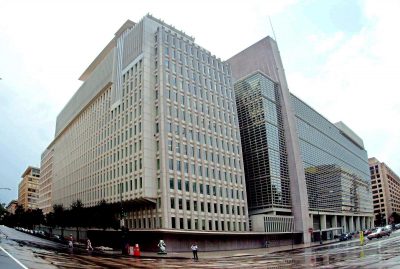The World Bank Country Director for Nigeria, Ms. Marie Francoise Marie-Nelly said Nigeria has been removed from the list of countries that benefit from the International Development Agency’s (IDA) concessionary window.
According to Ms Marie-Nelly, Nigeria is no longer classified as a poor Nation, so thus, was removed from the list of beneficiaries of the World Bank initiative. Consequently, the country will no longer benefit from the 40-year moratorium and 10-year repayment period on loans taken for developments from the World Bank.
Ms. Marie-Nelly explained that this decision was taken based on the figures released by the National Bureau of Statistic, which indicated that the poverty rate per capita in the country has gone down to 62.6 per cent from 64.2 per cent.
She explained that Nigeria will henceforth access funds from the International Bank for Reconstruction and Development (IBRD) window under different moratorium and interest payments terms.
The new funding arrangement for Nigeria’s projects in the years ahead was occasioned by what the World Bank described as the “re-classification of the country’s status from poor country by per capita to a lower-middle income country by per capita.” Lower-middle income countries are those whose per capita are $1,026 to $4,035 based on estimates of gross national income (GNI).
Ms. Marie-Nelly revealed that only a few months were left to the end of implementation of the bank’s 2nd Country Partnership Strategy (CPS) (2010-2013) in Nigeria, to which about N837 billion had been committed so far.
She said there are 70 technical activities valued at $183 million which are on-going, and three regional projects on agriculture, valued at $45 million; air transport, $46.7 million; and water resources, put at $135 million, adding that funding for these programmes was secured through the International Development Agency (IDA) concessionary window.
She said despite the introduction of the new funding terms from the bank, old projects and interventions will be continued, based on funds accessed through the International Development Agency (IDA) concessionary window, stating that Nigeria’s transition from extremely poor to low-middle income category would take between five to six years to be effected.
The World Bank Country Director, said that the urban poverty from 2003 to 2009 reduced to 51.2 per cent from 52.2 per cent, just as rural poverty dropped to 69 per cent from 73.4 per cent.
Also, poverty rate among adults in Nigeria went down to 46.1 per cent from 48.3 per cent, and urban poverty saw a reduction to 34.3 per cent from 36.8 per cent, adding that Rural poverty also dipped to 52.9 per cent from 57.4 per cent within the same period.
“The implementation of the second CPS has focused mainly on sustainable development; human development; governance and economic reforms; and private sector development and the interventions in the 2nd CPS had recorded modest achievements in key sectors like education, transportation, water, power, agriculture, good governance and private sector, through support for standardisation of some manufacturing and construction operational processes across the country.
“The key challenges that the Bank contended with was inability to meet deadline for some projects’ completion.”
She said the Bank would be moving towards result-based approach and away from input approach, so as to consolidate the Bank’s CPS performance over the years, as well in the third phase slated for implementation next year.
“Under the new CPS, our main objective will be to support improved competitiveness foster social inclusion and reduce vulnerability,” said Ms Marie-Nelly.

